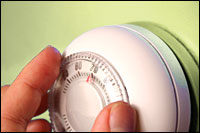
Grist prez Chip Giller appeared on NBC’s Today show on Monday, Nov. 5, chatting with Meredith Vieira about easy ways anyone can cut their energy use and help fight global warming. Follow one hint a day and you’re on your way!
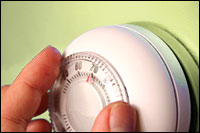
Day 1: Turn Down the Heat
Here’s a quick, easy solution that will save you money and save energy: turn down your thermostat. Lowering your heat in winter by just 2 degrees can cut your energy bill by 10 percent. Get an automatic or programmable thermostat to make it easy to save on heating; set it to turn down when you’re away from home or sleeping, and to turn back up half an hour before you’ll be up and about.
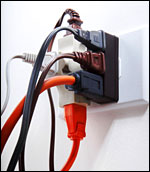
Day 2: Unplug Gadgets
Electronic equipment and appliances suck up energy even when they’re turned off — they’ve actually earned the nickname “vampires.” Americans waste $1 billion a year powering items like TVs and DVD players while they’re turned off. So unplug your TV, stereo, computer, microwave, and other equipment when you’re not using them — or plug a bunch of things into a power strip that you keep turned off unless you’re using one of the items. And make sure to unplug your cell-phone and MP3 chargers as soon as the devices are powered up.
Get tips from Grist advice columnist Umbra Fisk on using power strips and electric-use meters.

Day 3: Wash Clothes Efficiently
When it comes to laundry, there’s lots of room for savings. Ninety percent of the energy used in clothes washing goes to heat the water, so washing in cold is a simple way to cut energy use drastically. Wash only full loads. When it comes time to dry, make sure to check the lint screen before every load and clean it afterward. And if you want to take efficiency a step further, hang some or all items and let them air-dry instead of running them through the dryer.
Check out advice from Umbra Fisk on air-drying laundry and buying an efficient washing machine.

Day 4: Eat Less Meat
Meat production requires heaps more energy and resources than growing vegetables or grains; in fact, 18 percent of human-caused greenhouse gases comes from the livestock industry. You don’t have to be a strict vegetarian to make a difference in this area: try skipping meat just one day a week. If every American had one meat-free day per week, it would reduce emissions as much as taking 8 million cars off the roads.
Read more reasons to cut meat consumption from Grist advice guru Umbra Fisk, Grist staff writer David Roberts, and activist Bruce Friedrich.
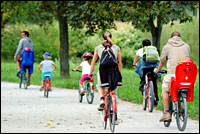
Day 5: Get Out of the Car
Vehicles consume half of the world’s oil, and spew a quarter of the world’s greenhouse-gas emissions. Leaving your car at home even one day a week can save a lot of gas and emissions over a year. Try walking, biking, carpooling, or taking the bus or subway to get where you need to go — or see if you could telecommute to work one day a week. When you do drive, make sure your tires are properly inflated — underinflated tires can cut your gas mileage by 5 percent.
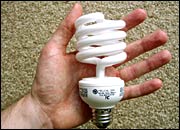
Day 6: Green Your Home
Pick one small project you can do around the house to cut energy use. Here are a few ideas: Replace regular light bulbs with compact fluorescent light bulbs (CFLs use about one-fifth as much energy as regular bulbs, and last about 12 times longer). Install a low-flow showerhead, which will save on water heating and use. Lower the temperature of your water heater to 120 degrees, and insulate the tank. If you’re feeling ambitious, undertake a home energy audit to identify projects for the future.

Day 7: Write a Letter
While it’s true that small changes at home can make a big difference, one of the most important things you can do when it comes to climate and energy is let business and political leaders know that you care about these issues. Take some time to write a letter to a store, a manufacturer, or your representative to thank them for their good work — or to encourage them to do better. Look at their websites for contact info. You don’t have to be an expert on the issues to speak up. And if we all put in our two cents, it will add up to some positive planetary change.
Get tips from Umbra Fisk on writing letters to representatives and businesses.

But Wait, There’s More!
Curious about additional things you can do to green your lifestyle and protect the planet? Check out Grist’s new book, Wake Up and Smell the Planet. It’s chock-full of friendly advice, and 100 percent free of preachiness and pomposity.
Grist’s Chip Giller and Katharine Wroth also appeared on NBC’s Today show on Tuesday, Nov. 6, talking about recycling things you didn’t know you could recycle.
